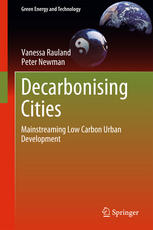

Most ebook files are in PDF format, so you can easily read them using various software such as Foxit Reader or directly on the Google Chrome browser.
Some ebook files are released by publishers in other formats such as .awz, .mobi, .epub, .fb2, etc. You may need to install specific software to read these formats on mobile/PC, such as Calibre.
Please read the tutorial at this link: https://ebookbell.com/faq
We offer FREE conversion to the popular formats you request; however, this may take some time. Therefore, right after payment, please email us, and we will try to provide the service as quickly as possible.
For some exceptional file formats or broken links (if any), please refrain from opening any disputes. Instead, email us first, and we will try to assist within a maximum of 6 hours.
EbookBell Team

4.1
90 reviewsThis book sets out some positive directions to move forward including government policy and regulatory options, an innovative GRID (Greening, Regenerative, Improvement Districts) scheme that can assist with funding and management, and the first steps towards an innovative carbon credit scheme for the built environment.
Decarbonising cities is a global agenda with huge significance for the future of urban civilisation. Global demonstrations have shown that technology and design issues are largely solved. However, the mainstreaming of low carbon urban development, particularly at the precinct scale, currently lacks sufficient: standards for measuring carbon covering operational, embodied and transport emissions; assessment and decision-making tools to assist in design options; certifying processes for carbon neutrality within the built environment; and accreditation processes for enabling carbon credits to be generated from precinct-wide urban development.
Numerous barriers are currently hindering greater adoption of high performance, low carbon developments, many of which relate to implementation and governance. How to enable and manage precinct-scale renewables and other low carbon technologies within an urban setting is a particular challenge.